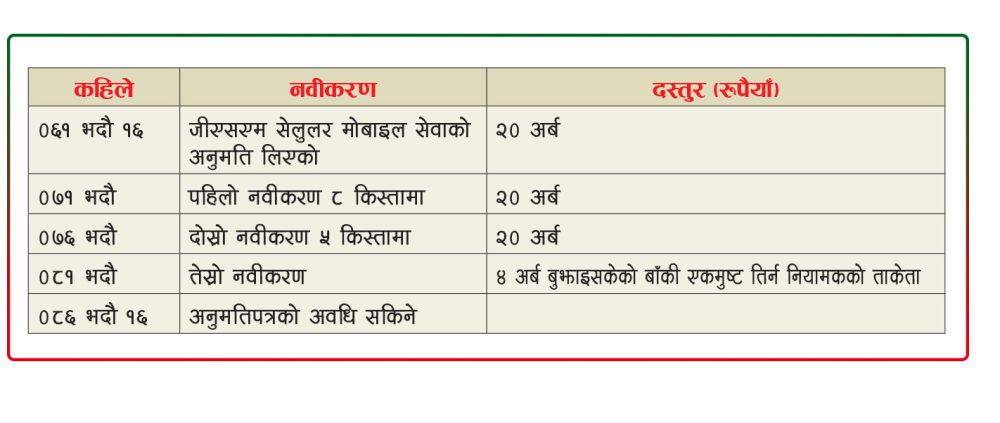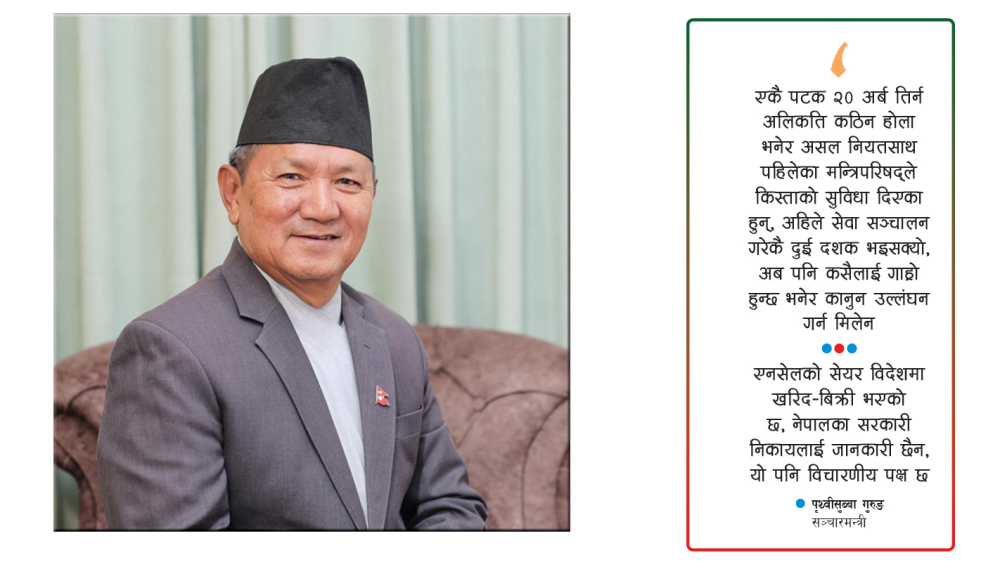Ncell's hesitance to pay 19 billion renewal fees for renewal even though dividends are being taken abroad

We use Google Cloud Translation Services. Google requires we provide the following disclaimer relating to use of this service:
This service may contain translations powered by Google. Google disclaims all warranties related to the translations, expressed or implied, including any warranties of accuracy, reliability, and any implied warranties of merchantability, fitness for a particular purpose, and noninfringement.

Highlights
- Since more than 50 percent of the shares are foreign, an attempt was made to evade the law, which would automatically become government after 25 years, but ignoring the authority's letter allowing for renewal with conditions.



As Ncell is about to complete 20 years, the deadline to renew for another 5 years is just a week away. There is a legal provision in which a telecommunications company using national resources (spectrum) will automatically become government after 25 years if foreign shares are more than 50 percent.

Ignoring the government's decision to allow renewal only on the condition that Ncell becomes a government company after five years as per the law, Ncell has not yet given its commitment. Instead, this company, which is continuously making profits, is doing political 'lobbying' to pay 19 billion for renewal fees in installments.
Ncell's license renewal deadline is August 16 only. According to the Telecommunications Act, 053, the license period is 25 years and must be renewed for the first time in 10 years and every five years thereafter. Section 33 of the Act states that the land, buildings, devices, equipment and structures related to telecommunication services where more than 50 percent of the total capital investment is foreign shall be owned by the Government of Nepal after the expiry of the permit period. According to the decision of the Council of Ministers last February, the Telecommunication Authority has been instructed to renew the license of the company so that it will automatically become government after five years.

Currently, 80 percent of the shares in Ncell are owned by Spectralite UK, whose investor is non-resident Nepali Satishlal Acharya. He bought this share from Aziata UK only last year. Likewise, 20 percent shares are also in the name of Sunivera Capital Ventures, a Nepali company owned by Satish Lal's Mrs. Bhavna Singh Shrestha.
There is a law of the government of Nepal that companies that take dividends abroad for up to 25 years. However, Satish Lal may try to transfer his full or partial shares in the name of a Nepali within the next five years and try to prevent the company from being nationalized. Prohibiting any change in the share structure in order to prevent the ownership of Ncell from coming to the government, the cabinet meeting on February 6 instructed the authority to ensure this at the time of renewal. But the authority, which has not responded to the issue of share ownership, is also trying not to pay the renewal fee in one lump sum.

The Telecommunication Authority says that Ncell has neglected to come for renewal with the condition of not being able to transfer names and a lump sum. "We have sent a letter to Ncell asking them to submit the dues to be paid as per the rules, and we have also informed them that the renewal will be done only if there is no change in the existing share ownership structure," said Santosh Paudel, spokesperson of the authority, "Renewal will only be done if the dues are submitted on time and if the government's conditions are met. '
In accordance with the provisions of Telecommunication Regulations, 054, three months before the license period expired, Ncell applied to the authority on May 14, but paid only four billion in fees. The authority had sent a letter to Ncell reminding them to deposit the remaining 16 billion rupees and also reminding them of the conditions of the Council of Ministers. In response to that, Ncell is hesitating to pay the dues with the condition of paying the renewal fee in installments for the next 5 years. The authority has also asked Ncell to pay 15 percent additional fee for the delay.
In sub-rule (2) of Rule 12 of the Telecommunication Regulations, it is mentioned that if the license holder wants to renew the license, he should apply to the renewal fee authority three months before the expiry of the license period. Sub-rule 3 provides for additional fees. As Ncell could not pay 20 billion rupees on time for renewal, Ncell now has to pay the remaining 16 billion rupees by August 16 and a total of 19 billion rupees including 3 billion for 15 percent additional charges.
On the other hand, Ncell has previously been complaining about clear discrimination against government-owned Nepal Telecom by saying that it had given facility to pay a lump sum fee five years after the deadline for renewal and did not even charge a fine for late payment. However, the government has already given such facilities to Ncell twice before. Moreover, the report of the Auditor General has clearly mentioned that the installment facility provided by the government in the previous license renewal fee is also against the law.
The authority has informed the government that since a clear law has been made regarding the renewal fee, such a facility cannot be provided and it does not have the right to do so. "Despite the authority repeatedly asking Ncell to submit the required fee for the license renewal, we have informed the Ministry of Communication about the fact that it has not submitted and is asking for installment facility," says spokesperson Paudel, "The authority has no right to grant installment facility, previously the government has also given installment facility to Ncell twice. given We have sent a letter to the Minister of Communications informing him about the time period etc. It is now the subject of the ministry.'
Communications Minister Prithvisubba Gurung also said that since there is no provision in the law to provide the installment facility that Ncell is asking for, it is not binding. "Speaking from the ministry level, there is no installment facility this time, there was no question of providing facilities by changing the law," he told Kantipur. Now, it has been two decades since the service has been operating, and it has also earned income. Even now it is not possible to violate the law because it will be difficult for someone.'
Minister Gurung says that Ncell's share ownership buying and selling process is also not legal. Ncell's shares have been bought and sold abroad as they can only be bought and sold after informing the regulator and taking pre-approval. Government agencies of Nepal have no information. This is also a consideration, he said.
 प्रकाशित : भाद्र १०, २०८१ ०६:५०
प्रकाशित : भाद्र १०, २०८१ ०६:५०

 २३.१२°C काठमाडौं
२३.१२°C काठमाडौं











